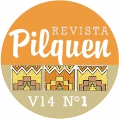Learning and its conditions: a singular relationship in university professors
Keywords:
Young, Adults, Modes of relations, Generations, Educational inclusionAbstract
This paper focuses on one of the objectives of research Young and adult. Different ways of transiting and signifying educational experiences at the middle level, within the framework of the Research Program Educational practices. Approach from the experiences and meanings of young people and adults, developed at Centro Universitario Regional Zona Atlántica, Universidad Nacional del Comahue, aimed at analyzing the experiences and meanings of young people and adults regarding the generational relationships that make possible the educational. From a qualitative methodological perspective that allows study subjects and groups in context, considering both their actions and their views, interpretations and meanings in relation to the actions themselves, interviews were conducted and, further analysis, we note that sharing the same age does not ensure the same behaviors, interests and attitudes into the classroom. Watching young people in school from a generational perspective allows us to understand the particularities of the relationships in which they are immersed, as well as the context in which these interactions take place. This paper presents some of the modalities of relationships established between young students and adults in the middle school at night, relationships based on the assimilation of experiences; Relationships of trust; Relations of mutual cooperation and/or conflict relations.Downloads
References
Antelo, Estanislao. “El desprecio en la noche de ignorancia”. Correo del maestro. México, 2014, 19: 1-7.
Arendt, Hannah. Entre el pasado y el futuro. Barcelona: Península. 1996.
Bourdieu, Pierre. “La juventud no es más que una palabra”. Pierre Bourdieu. Sociedad y Cultura. México: Grijalbo. 1990, pp.163-171.
Cornu, Laurence. “La confianza en las relaciones pedagógicas” en Frigerio, Graciela; Poggi; Margarita y Korinfeld, Daniel (comps.). Construyendo un saber sobre el interior de la escuela. Buenos Aires: Novedades Educativas y CEM, 1999: 19-26.
Duarte, Klaudio. “Mundos jóvenes, mundos adultos: lo generacional y la reconstrucción de los puentes rotos en el liceo. Una mirada desde la convivencia escolar”. Última década, Viña del Mar: CIPDA, 2002, 16: 95-114.
Elías, Norbert. “Ensayo acerca de las relaciones entre establecidos y forasteros”. Revista Española de Investigaciones Sociológicas (REIS), 2003, 104: 219-255.
Fabbri, Sonia y Cuevas, Verónica. “Inmigrantes Escolares”. Revista Pilquen, Sección Psicopedagogía, 2011, Año XIII, 7, 1-9.
Feixa, Carles y Leccardi, Carmen. “El concepto de generación en las teorías sobre la juventud”. Ultima década, Viña del Mar: CIPDA, 34, 2011: 11-32.
Ghiardo, Felipe. “Generaciones y juventud: una relectura desde Mannheim y Ortega y Gasset”. Última Década, Viña del Mar: CIPDA, 20, 2004, 11-46.
Kaplan, Carina. La inclusión como posibilidad. Buenos Aires: Ministerio de Educación, Ciencia y Tecnología. 2006.
Mannheim, Karl. “El problema de las generaciones”. Revista Española de investigación sociológica, 62, 1928/1993: 193-242.
Orce, Victoria. “La perspectiva generacional y lo familiar en los estudios sobre juventud. Un aporte desde la investigación Socioeducativa”. Ponencia en II Jornadas Internacionales “Sociedades Contemporáneas, Subjetividad y Educación”. CABA, UBA 9-11 de abril de 2014.
Ortega y Gasset, José. El tema de nuestro tiempo. Buenos Aires: Austral. [1966], 1970.
Romagnoli, María Cristina et al. “Desigualdades sociales y educativas en las “elecciones” y los recorridos escolares”. Informe final de Investigación. Mendoza: Secretaría de Ciencia y Técnica, Universidad Nacional de Cuyo, 2009
Sennett, Richard. Juntos. Rituales, placeres y política de la cooperación. Barcelona: Anagrama. 2012.
Sirvent, María Teresa. Educación de adultos: investigación, participación, desafíos y contradicciones. Buenos Aires: Miño y Dávila editores. 2008
Vommaro, Pablo. “Aproximaciones a las relaciones entre juventudes políticas y culturas en la Argentina y América Latina actuales: miradas desde las modalidades de participación política de los jóvenes en movimientos sociales”. Juventudes en la Argentina y América Latina: política, cultura e identidades del siglo XX al XXI- CABA: CAICYT-CONICET. Disponible en http://www.cursoscaicyt.gov.ar. 2012.
Downloads
Published
How to Cite
Issue
Section
License
Revista Pilquen, Sección Psicopedagogía sostiene su compromiso con las políticas de Acceso Abierto a la información científica, al considerar que tanto las publicaciones científicas como las investigaciones financiadas con fondos públicos deben circular en Internet en forma libre, gratuita y sin restricciones.
Los trabajos presentados en Revista Pilquen, Sección Psicopedagogía deben ser originales e inéditos y no estar postulados simultáneamente en otras revistas. El envío de todo tipo de colaboración implica la aceptación de las normas editoriales de la revista y la autorización al Comité Editorial para que difunda los trabajos tanto en la revista como en las bases de datos o sistemas de indización en donde se alojan los contenidos de Pilquen.
Los autores que publican en esta revista están de acuerdo con los siguientes términos:
1) Los autores conservan los derechos de autor y garantizan a la revista el derecho de ser la primera publicación del trabajo al igual que licenciado bajo una Creative Commons "Atribución -No Comercial CC BY-NC-SA”, mediante la cual ser permite copiar, reproducir, distribuir, comunicar públicamente la obra y generar obras derivadas, siempre y cuando se cite y reconozca al autor original. No se permite, sin embargo, utilizar la obra ni sus posibles obras derivadas con fines comerciales.
2) Los autores pueden establecer por separado acuerdos adicionales para la distribución no exclusiva de la versión de la obra publicada en la revista (por ejemplo, situarlo en un repositorio institucional o publicarlo en un libro), con un reconocimiento de su publicación inicial en esta revista.
3) El o los autores no recibirán compensación monetaria de Pilquen por el uso del material contenido en el artículo; así como tampoco asumirán ningún costo de publicación de los mismos.













